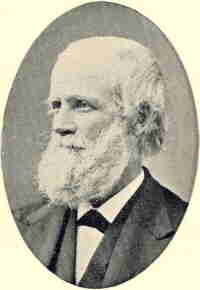 SKC Films Library |
| SKC Films Library >> Science >> Geology >> General |
| B. F. Mudge collector and discoverer of fossils
Benjamin Franklin Mudge was born in Orrington, Maine, on August 11, 1817. His family moved to Lynn, Massachusetts, in 1818, where he was educated in the local public schools. He worked as a shoemaker for six years before studying natural sciences and the classics at Wesleyan University, from which he graduated in 1840. After earning his Master of Arts degree, he studied for and passed the bar, and began practicing law in 1842. He was elected Mayor of Lynn in 1852, but only served one brief term before ending his "career" as a politician. In 1859 he moved to Cloverport, Kentucky, where he worked as a chemist at an oil refinery. After the Civil War broke out in 1861, Mudge moved his family to Quindaro, Kansas (now part of Kansas City, Kansas), where he taught school and participated in anti-slavery activities. In 1862, he was asked to deliver a series of lectures before the State Legislature, which resulted in his being named the first official State Geologist in 1864. He led the first-ever geological survey of Kansas and published the first Geology of Kansas that same year. He became chair of the geology department at Kansas State Agricultural College (now Kansas State University) in 1865, and served in that capacity until 1873. An avid collector of fossils, Mudge was one of the first geologists to keep extensive and accurate field notes documenting every single find. Since he had no formal training in paleontology, he sent most of his fossils to the East Coast to be described by some of the most noted paleontologists of his day, including Othniel Charles Marsh and Edward Drinker Cope. His discoveries included at least 80 new species of extinct animals and plants, including Ichthyornis, the first "bird with teeth." Other early fossil finds included vertebrate tracks near Junction City (1865); invertebrates and Late Cretaceous deciduous leaves near Ellsworth (1866); plants and saurians from the Republican River (1869); plesiosaurs and fish near Fort Wallace (1870); and, plants, molluscs, vertebrates and Hesperornis (an early bird) from western Kansas (1871). Beginning in 1873, Mudge led several fossil collecting expeditions for Othniel Marsh, who had been the first to study and describe Ichthyornis. These expeditions led to discovery of the type fossils of both Diplodocus and Allosaurus, as well as the first extensive excavations of the dinosaur beds in Colorado. Mudge co-founded the Kansas Natural History Society ( now the Kansas Academy of Science) with John D. Parker in 1867, and became a fellow of the American Association for the Advancement of Science in 1878. Many of his fossils are still treasured by prestigious institutions, with over 300 in Yale's Peabody Museum of Natural History alone and hundreds more housed at the Smithsonian Institution. He died in Manhattan, Kansas, on November 21, 1879.
SEE ALSO |
| SKC Films Library
>> Science >> Geology >> General This page was last updated on 09/22/2017. |
